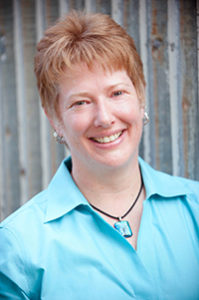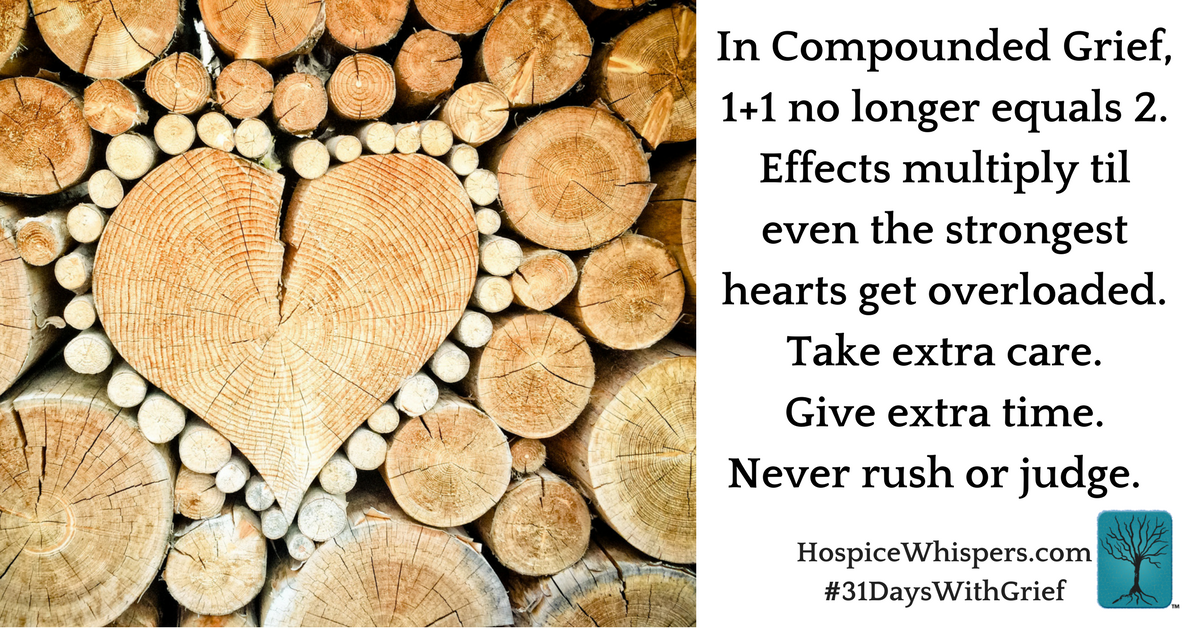31 Days of Walking with Grief: Others’ and Our Own
Day 20—Compounded and Collective Grief
This is a month-long series to support persons grieving and those who love them. It includes content from “Sharing Our Stories: A Hospice Whispers Grief Support Workbook” available through Amazon and wherever books are sold.
This post is a bit longer than most in this series, because I’m touching on several topics—compounded grief, collective grief, compassion fatigue, and adrenal fatigue. I hope something in this is helpful for you and for those about whom you care.
It’s been a tough year…
Each year, I look forward to the nostalgic retrospectives on television that review the world’s major news stories and honor the celebrities and other national figures who have died. But this year, I couldn’t! There’s just been way too much.
Beloved musicians who gave us the soundtracks of our youth or helped us have hope during hard times; gentle-faced tv moms who served as a surrogate and role model for many; those who made us laugh and believe in chocolate-coated dreams; villains of stage and screen we couldn’t help but love; newscasters whose calm voice helped us feel safe during challenging times; and even sci-fi heroines who reminded us that even princesses could be, well, badass…the grim reaper has been working overtime in 2016.
Add to this the killings of both black and blue and brown, world crises, acts of terror, and one of the most contentious political seasons in recent history, and we’re all more than a little wiped out.
We often don’t recognize Compounded Grief…
What many are dealing with, but don’t realize it, is not only compassion fatigue, but also compounded grief.
Compassion fatigue, in short, is when our caring muscles are worn out and need rest and care to heal and recharge.
Compounded grief is the phenomenon of facing multiple griefs that come faster than we can process them, so that 1 plus 1 no longer equals 2, but instead multiplies exponentially until our grief muscles simply can’t carry them all.
Another thing to consider is that the exhaustion that comes with stressful times doesn’t always hit us during the stressful event. Our adrenals kick into high gear to take care of us and keep us going. It’s a normal and adaptive response to stress.
Eventually they give out, like anything else, and need time to rest and recover. This is known as adrenal fatigue, and is common, but what most don’t realize is that they don’t tend to conk out in the middle of our stress, but wait until the stressful time is over and THEN decide to go on sick leave.
That’s why many are caught off guard that they initially feel better after a period of stress has passed, only to hit a wall and crash hard on the couch a couple of days or weeks later. The adrenals have quietly gone on strike and said, “Yay! Now we can nap for a while”, leaving us even more worn out that even before.
Collective grief can add to the challenge…
Compounded grief takes a toll on us emotionally and physically, yet we’re rarely prepared for or aware of this and think something is wrong with us, that we’re being wimpy or weak or dysfunctional. With so many in this country experiencing compounded grief from this challenging year without even knowing it, we’re also subject to the impact of collective grief, where those around us are also grieving. Just being in the proximity of so many who are suffering can take an even greater toll on us.
In some ways, collective grief is helpful because we may have more space to process with others who are just as ready to talk as are we. It also helps to not feel alone when we’re mourning. But just like different members in the same family can grieve a loss in very different ways, so too do we see various coping styles from those around us. Some get quiet and pull away while others get loud and angry, with every other type of coping in between represented.
Being around that much grief expressed in that many ways can be more overwhelming than helpful. We must be careful with our exposure to conversations at gatherings and on social media, even in the news, and take in only what seems to be helping us cope and process and turn it off or kindly walk away when it’s counter-productive for our sanity, health, and relationships.
When we’re already tired…
For those who are already dealing with grief in their personal lives, any additional stress can be more than they can bear. Being around this compounded and collective grief many in our country are experiencing and expressing may be intolerable to add to their already heavy load. Remember, our compassion muscles are already overloaded and fatigued, so we have less to give others.
We’re so weary from walking with our own stories that we can’t carry anyone else’s.
This may lead our defenses to kick in and offload being around others’ grief, which can look like being impatient with or shaming of others’ pain and frustration. We can’t do that! We must learn a way to take grief out of the shadows and release it from the added burdens of disconnection and shame. The only way we can do that is together.
This is a natural response to inordinate circumstances…
So if you’re struggling more than you think you should, if you’re exhausted more than seems reasonable, if you’re cranky and crabby and not fit for human consumption because of your impatience and overload, please hear me—you are crazy.
Words exist for what you’re feeling and going through. You are not weak or too emotional and you definitely are not alone. You are simply a normal human being going through an abnormal time of compounded and collective grief that is far greater than what we’ve experienced since 9/11 and its aftermath.
The most healthy and tough and mature and boundaried of persons will crumble when pushed far enough. Often we hold ourselves to such a high standard that we are shocked and caught off guard and can’t figure out what’s wrong with us when we’re experiencing a natural response to an unnatural compilation of events.
Be gentle, with yourself and each other…
Be extra protective of your emotions. Be aware of the music, television, post casts, news casts, and social media to which you’re exposing yourself. Your ability to filter out harsh or negative words and sounds and images is probably weakened and your already heavily overloaded emotions can’t handle as much these days, nor should they!
I was at the blessing of twin babies last night. It was happening earlier than was probably wise for these two preemies, whose immune systems are still developing, but it was the only time many family members could see them before they traveled back to their home state.
The daddies held them closely in chest wraps and pulled the soft cloth back briefly so loved ones could catch a peek and say hello to the newest members of the family. Some loved ones stayed home from the party because they had a cough, most likely due to the awful allergy season we’re facing, but they didn’t want to take any chances at having something that might drift to the babies.
No one complained that any of the group was being overly protective. Love doesn’t make everything about us, but wants what is healthy for the other. No one judged the infants for not having a strong enough immune system, yet. Love doesn’t shame or rush another’s process.
When did we decide that taking good care of grief and being tender with tender hearts was weak? Take just as good of care of yourself as you would the most beloved persons in your life.
Soft fabrics, quiet space, yummy foods (though be mindful of the ways that alcohol, sugar, and caffeine can dehydrate and depress our systems), sunshine, puppies and kitties or your pet iguana—surround yourself with whatever you need. Move a little, even just 10 minutes, to get oxygen to your brain, but don’t overdo it; those adrenals and your brain and body need all the resources they can get to recover and process the stress of grief. Give them that.
Be slow. Be safe. Pay extra attention. Your brain can be fuzzy-brained and distracted, processing grief in the background of your mind as you go about your day, often behind the wheel of 1-ton machinery going 80 miles an hour, surrounded by others who are also grieving and wiped out.
Whatever you do, simply be gentle and tell any shame gremlins that start to bite at your ankles that there is no shame in being normal and everything right about being human. After all, if we can’t sit with and have compassion for our own pain, how can we even begin to be able to be with others?
May we all find our own ways to care wisely for our grief and be compassionate with ourselves and each other as we all seek to heal and recover.
Peace,
Carla
 Rev. Carla Cheatham, MA, MDiv, PhD, TRT has served hospices as a chaplain and bereavement coordinator. She’s the Section Leader for the Spiritual Caregivers Section of the National Hospice and Palliative Care Organization and an adjunct professor at the Seminary of the Southwest. Through her Carla Cheatham Consulting Group, Carla provides training and consulting for professional caregivers nationwide. She is the author of Hospice Whispers: Stories of Life and its companion volume, Sharing Our Stories: A Hospice Whispers Grief Support Workbook. Her next book, On Showing Up with Suffering: Others’ and Our Own, is set to publish in 2017.
Rev. Carla Cheatham, MA, MDiv, PhD, TRT has served hospices as a chaplain and bereavement coordinator. She’s the Section Leader for the Spiritual Caregivers Section of the National Hospice and Palliative Care Organization and an adjunct professor at the Seminary of the Southwest. Through her Carla Cheatham Consulting Group, Carla provides training and consulting for professional caregivers nationwide. She is the author of Hospice Whispers: Stories of Life and its companion volume, Sharing Our Stories: A Hospice Whispers Grief Support Workbook. Her next book, On Showing Up with Suffering: Others’ and Our Own, is set to publish in 2017.



Leave a Reply